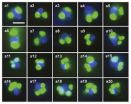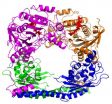(Press-News.org) In a paper published today in the journal Science, a University of California, Davis, researcher and his co-authors challenge a widely held assumption that plants will move uphill in response to warmer temperatures.
Between 1930 and 2000, instead of colonizing higher elevations to maintain a constant temperature, many California plant species instead moved downhill an average of 260 feet, said Jonathan Greenberg, an assistant project scientist at the UC Davis Center for Spatial Technologies and Remote Sensing.
"While the climate warmed significantly in this period, there was also more precipitation. These wetter conditions are allowing plants to exist in warmer locations than they were previously capable of," Greenberg said.
Many forecasts say climate change will cause a number of plants and animals to migrate to new ranges or become extinct. That research has largely been based on the assumption that temperature is the dominant driver of species distributions. However, Greenberg said the new study reveals that other factors, such as precipitation, may be more important than temperature in defining the habitable range of these species.
The findings could have global relevance, because many locations north of 45 degrees latitude (which includes the northernmost United States, virtually all of Canada and Russia, and most of Europe) have had increased precipitation in the past century, and global climate models generally predict that trend will continue, the authors said.
"As we continue to improve our understanding of climate-change impacts on species, we will help land managers and policy makers to make more informed decisions on, for instance, conservation efforts for threatened and endangered species," Greenberg said.
He added that the study underlines the importance of an investment in basic science, as the results are based on historical data collected by the U.S. Forest Service in the 1930s, a program that was supported by New Deal spending after the Great Depression.
INFORMATION:
The study is titled "Changes in climatic water balance drive downhill shifts in plant species' optimum elevations." Greenberg's co-authors are: graduate student Shawn Crimmins (the lead author); assistant professor Solomon Dobrowski (a UC Davis alumnus) and research analyst Alison Mynsberge, all of the University of Montana; and assistant professor John Abatzoglou of the University of Idaho.
Funding was provided by the U.S. National Science Foundation and the U.S. Forest Service.
More information:
UC Davis Center for Spatial Technologies and Remote Sensing:
http://www.cstars.ucdavis.edu/
Media contacts:
Jonathan Greenberg, UC Davis Center for Spatial Technologies and Remote Sensing (CSTARS), Department of Land, Air and Water Resources, (415) 763-5476, greenberg@ucdavis.edu
Solomon Dobrowski, University of Montana College of Forestry and Conservation, (406) 243-6068, solomon.dobrowski@cfc.umt.edu.
Sylvia Wright, UC Davis News Service, (530) 752-7704, swright@ucdavis.edu
UC Davis study shows plants moved downhill, not up, in warming world
Increased precipitation is the key, authors say
2011-01-21
ELSE PRESS RELEASES FROM THIS DATE:
Simple, ingenious way to create lab-on-a-chip devices could become a model for teaching and research
2011-01-21
With little more than a conventional photocopier and transparency film, anyone can build a functional microfluidic chip.
A local Cambridge high school physics teacher invented the process; now, thanks to a new undergraduate teaching lab at Harvard's School of Engineering and Applied Sciences (SEAS), students will be able explore microfluidics and its applications.
The Microfluidics Lab, developed by Dr. Anas Chalah, Director of Instructional Technology at SEAS, takes advantage of a simple but ingenious new method of creating lab-on-a-chip devices that are quick to produce, ...
Speaking the same language means better health care quality, Wayne State University study finds
2011-01-21
DETROIT—Wayne State University researchers have found that when patients and providers speak the same language, patients report less confusion and better health care quality. The findings were based on data from the Pew Hispanic Center/Robert Wood Johnson Foundation's Latino Health Survey.
Understanding the relationship between language and health care quality has important public health implications for providing services in an increasingly diverse U.S. population, according to Hector M. González, Ph.D., assistant professor of family medicine and public health at WSU's ...
Strong social ties benefit breast cancer patients
2011-01-21
Breast cancer patients who have a strong social support system in the first year after diagnosis are less likely to die or have a recurrence of cancer, according to new research from Vanderbilt-Ingram Cancer Center (VICC) and the Shanghai Institute of Preventive Medicine. The study, led by first author Meira Epplein, Ph.D., assistant professor of Medicine at VICC, was published in a recent edition of the Journal of Clinical Oncology.
Patients in the study were enrolled in the Shanghai Breast Cancer Survivor Study, a large, population-based review of female breast cancer ...
Newly discovered group of algae live in both fresh water and ocean
2011-01-21
A team of biologists has discovered an entirely new group of algae living in a variety of marine and freshwater environments. This group of algae, which the researchers dubbed "rappemonads," have DNA that is distinctly different from that of other known algae. In fact, humans and mushrooms are more closely related to each other than rappemonads are to some other common algae (such as green algae). Based on their DNA analysis, the researchers believe that they have discovered not just a new species or genus, but a potentially large and novel group of microorganisms.
The ...
Red blood cell hormone modulates the immune system
2011-01-21
New research reveals that a hormone best known for stimulating the production of red blood cells can modulate the immune response. The study, published by Cell Press in the January 27th issue of the journal Immunity, finds that erythropoietin (EPO) has contrasting influences on infectious and inflammatory diseases and may be useful in the design of new therapeutic strategies.
EPO is a cytokine hormone that stimulates the production of red blood cells by acting at EPO receptors (EPORs) on red blood cell precursors. Interestingly, other cell types also express EPORs. ...
Controlling symptoms can lead to improved quality of life for end-of-life patients
2011-01-21
LOUISVILLE, Ky. – Healthcare workers can most directly affect quality of life (QOL) of patients with advanced stage lung cancer by helping manage symptoms such as pain, lack of energy, shortness of breath, coughing, difficulty sleeping and dry mouth, according to a study recently published in the journal Oncology Nursing Forum.
Understanding the symptoms, particularly symptom distress - or the degree to which a symptom bothers a person, is crucial to improved patient care. Intervention at the time of diagnosis is important because patients with stage IIIb or IV lung cancer ...
Go figure: Math model may help researchers with stem cell, cancer therapies
2011-01-21
The difficult task of sorting and counting prized stem cells and their cancer-causing cousins has long frustrated scientists looking for new ways to help people who have progressive diseases.
But in a development likely to delight math teachers, University of Florida researchers have devised a series of mathematical steps that accomplishes what the most powerful microscopes, high-throughput screening systems and protein assays have failed to do — assess how rapidly stem cells and their malignant, stemlike alter egos increase their numbers.
The method, published in the ...
How the hat fits: Structural biology study reveals shape of epigenetic enzyme complex
2011-01-21
To understand the emerging science of epigenetics—a field that describes how genes may be regulated without altering the underlying DNA itself—scientists are deciphering the many ways in which enzymes act on the proteins surrounding DNA within cells.
One type of these enzymes, proteins known as histone acetyltransferases (HATs), act on DNA by modifying DNA-bound proteins called histones. This act of modification, called acetlyation, can dictate how histones interact with DNA and other proteins affecting processes such as DNA replication, transcription (reading the gene), ...
State of the Union 2011: Will President Obama commit to R&D, for jobs and economic growth?
2011-01-21
Research!America's chair, former Congressman John E. Porter (R-IL), and Research!America's CEO, Mary Woolley, issued the following statement in anticipation of President Barack Obama's State of the Union address.
Porter said, "I think the president understands that science, technology, innovation and research are where we lead the world and where we must make the ongoing investments to maintain that leadership. But he must, both in his State of the Union speech next Tuesday night and in the Budget he submits to Congress, make the case to both the American people and ...
NASA prepares to launch next Earth-observing satellite mission
2011-01-21
WASHINGTON -- NASA's newest Earth-observing research mission is nearing launch. The Glory mission will improve our understanding of how the sun and tiny atmospheric particles called aerosols affect Earth's climate. Glory also will extend a legacy of long-term solar measurements needed to address key uncertainties about climate change.
Glory is scheduled to launch from Vandenberg Air Force Base in California on Feb. 23 at 5:09 a.m. EST. It will join a fleet called the Afternoon Constellation or "A-train" of satellites. This group of other Earth-observing satellites, including ...
LAST 30 PRESS RELEASES:
Jeonbuk National University researchers explore metal oxide electrodes as a new frontier in electrochemical microplastic detection
Cannabis: What is the profile of adults at low risk of dependence?
Medical and materials innovations of two women engineers recognized by Sony and Nature
Blood test “clocks” predict when Alzheimer’s symptoms will start
Second pregnancy uniquely alters the female brain
Study shows low-field MRI is feasible for breast screening
Nanodevice produces continuous electricity from evaporation
Call me invasive: New evidence confirms the status of the giant Asian mantis in Europe
Scientists discover a key mechanism regulating how oxytocin is released in the mouse brain
Public and patient involvement in research is a balancing act of power
Scientists discover “bacterial constipation,” a new disease caused by gut-drying bacteria
DGIST identifies “magic blueprint” for converting carbon dioxide into resources through atom-level catalyst design
COVID-19 vaccination during pregnancy may help prevent preeclampsia
Menopausal hormone therapy not linked to increased risk of death
Chronic shortage of family doctors in England, reveals BMJ analysis
Booster jabs reduce the risks of COVID-19 deaths, study finds
Screening increases survival rate for stage IV breast cancer by 60%
ACC announces inaugural fellow for the Thad and Gerry Waites Rural Cardiovascular Research Fellowship
University of Oklahoma researchers develop durable hybrid materials for faster radiation detection
Medicaid disenrollment spikes at age 19, study finds
Turning agricultural waste into advanced materials: Review highlights how torrefaction could power a sustainable carbon future
New study warns emerging pollutants in livestock and aquaculture waste may threaten ecosystems and public health
Integrated rice–aquatic farming systems may hold the key to smarter nitrogen use and lower agricultural emissions
Hope for global banana farming in genetic discovery
Mirror image pheromones help beetles swipe right
Prenatal lead exposure related to worse cognitive function in adults
Research alert: Understanding substance use across the full spectrum of sexual identity
Pekingese, Shih Tzu and Staffordshire Bull Terrier among twelve dog breeds at risk of serious breathing condition
Selected dog breeds with most breathing trouble identified in new study
Interplay of class and gender may influence social judgments differently between cultures
[Press-News.org] UC Davis study shows plants moved downhill, not up, in warming worldIncreased precipitation is the key, authors say




